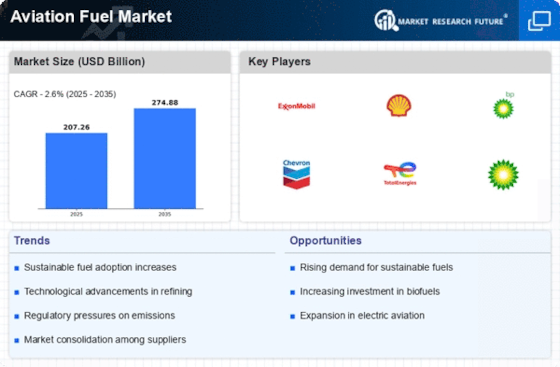Jet A
Jet A-1
Jet B
Avgas
Sustainable Aviation Fuel
Commercial Aviation
Military Aviation
General Aviation
Direct Sales
Distributors
Retailers
Cargo Transportation
Passenger Flights
Charter Services
North America
Europe
South America
Asia Pacific
Middle East and Africa
North America Outlook (USD Billion, 2019-2035)
North America Aviation Fuel Market by Fuel Type
Jet A
Jet A-1
Jet B
Avgas
Sustainable Aviation Fuel
North America Aviation Fuel Market by End Use Type
Commercial Aviation
Military Aviation
General Aviation
North America Aviation Fuel Market by Distribution Channel Type
Direct Sales
Distributors
Retailers
North America Aviation Fuel Market by Application Type
Cargo Transportation
Passenger Flights
Charter Services
North America Aviation Fuel Market by Regional Type
US
Canada
US Outlook (USD Billion, 2019-2035)
US Aviation Fuel Market by Fuel Type
Jet A
Jet A-1
Jet B
Avgas
Sustainable Aviation Fuel
US Aviation Fuel Market by End Use Type
Commercial Aviation
Military Aviation
General Aviation
US Aviation Fuel Market by Distribution Channel Type
Direct Sales
Distributors
Retailers
US Aviation Fuel Market by Application Type
Cargo Transportation
Passenger Flights
Charter Services
CANADA Outlook (USD Billion, 2019-2035)
CANADA Aviation Fuel Market by Fuel Type
Jet A
Jet A-1
Jet B
Avgas
Sustainable Aviation Fuel
CANADA Aviation Fuel Market by End Use Type
Commercial Aviation
Military Aviation
General Aviation
CANADA Aviation Fuel Market by Distribution Channel Type
Direct Sales
Distributors
Retailers
CANADA Aviation Fuel Market by Application Type
Cargo Transportation
Passenger Flights
Charter Services
Europe Outlook (USD Billion, 2019-2035)
Europe Aviation Fuel Market by Fuel Type
Jet A
Jet A-1
Jet B
Avgas
Sustainable Aviation Fuel
Europe Aviation Fuel Market by End Use Type
Commercial Aviation
Military Aviation
General Aviation
Europe Aviation Fuel Market by Distribution Channel Type
Direct Sales
Distributors
Retailers
Europe Aviation Fuel Market by Application Type
Cargo Transportation
Passenger Flights
Charter Services
Europe Aviation Fuel Market by Regional Type
Germany
UK
France
Russia
Italy
Spain
Rest of Europe
GERMANY Outlook (USD Billion, 2019-2035)
GERMANY Aviation Fuel Market by Fuel Type
Jet A
Jet A-1
Jet B
Avgas
Sustainable Aviation Fuel
GERMANY Aviation Fuel Market by End Use Type
Commercial Aviation
Military Aviation
General Aviation
GERMANY Aviation Fuel Market by Distribution Channel Type
Direct Sales
Distributors
Retailers
GERMANY Aviation Fuel Market by Application Type
Cargo Transportation
Passenger Flights
Charter Services
UK Outlook (USD Billion, 2019-2035)
UK Aviation Fuel Market by Fuel Type
Jet A
Jet A-1
Jet B
Avgas
Sustainable Aviation Fuel
UK Aviation Fuel Market by End Use Type
Commercial Aviation
Military Aviation
General Aviation
UK Aviation Fuel Market by Distribution Channel Type
Direct Sales
Distributors
Retailers
UK Aviation Fuel Market by Application Type
Cargo Transportation
Passenger Flights
Charter Services
FRANCE Outlook (USD Billion, 2019-2035)
FRANCE Aviation Fuel Market by Fuel Type
Jet A
Jet A-1
Jet B
Avgas
Sustainable Aviation Fuel
FRANCE Aviation Fuel Market by End Use Type
Commercial Aviation
Military Aviation
General Aviation
FRANCE Aviation Fuel Market by Distribution Channel Type
Direct Sales
Distributors
Retailers
FRANCE Aviation Fuel Market by Application Type
Cargo Transportation
Passenger Flights
Charter Services
RUSSIA Outlook (USD Billion, 2019-2035)
RUSSIA Aviation Fuel Market by Fuel Type
Jet A
Jet A-1
Jet B
Avgas
Sustainable Aviation Fuel
RUSSIA Aviation Fuel Market by End Use Type
Commercial Aviation
Military Aviation
General Aviation
RUSSIA Aviation Fuel Market by Distribution Channel Type
Direct Sales
Distributors
Retailers
RUSSIA Aviation Fuel Market by Application Type
Cargo Transportation
Passenger Flights
Charter Services
ITALY Outlook (USD Billion, 2019-2035)
ITALY Aviation Fuel Market by Fuel Type
Jet A
Jet A-1
Jet B
Avgas
Sustainable Aviation Fuel
ITALY Aviation Fuel Market by End Use Type
Commercial Aviation
Military Aviation
General Aviation
ITALY Aviation Fuel Market by Distribution Channel Type
Direct Sales
Distributors
Retailers
ITALY Aviation Fuel Market by Application Type
Cargo Transportation
Passenger Flights
Charter Services
SPAIN Outlook (USD Billion, 2019-2035)
SPAIN Aviation Fuel Market by Fuel Type
Jet A
Jet A-1
Jet B
Avgas
Sustainable Aviation Fuel
SPAIN Aviation Fuel Market by End Use Type
Commercial Aviation
Military Aviation
General Aviation
SPAIN Aviation Fuel Market by Distribution Channel Type
Direct Sales
Distributors
Retailers
SPAIN Aviation Fuel Market by Application Type
Cargo Transportation
Passenger Flights
Charter Services
REST OF EUROPE Outlook (USD Billion, 2019-2035)
REST OF EUROPE Aviation Fuel Market by Fuel Type
Jet A
Jet A-1
Jet B
Avgas
Sustainable Aviation Fuel
REST OF EUROPE Aviation Fuel Market by End Use Type
Commercial Aviation
Military Aviation
General Aviation
REST OF EUROPE Aviation Fuel Market by Distribution Channel Type
Direct Sales
Distributors
Retailers
REST OF EUROPE Aviation Fuel Market by Application Type
Cargo Transportation
Passenger Flights
Charter Services
APAC Outlook (USD Billion, 2019-2035)
APAC Aviation Fuel Market by Fuel Type
Jet A
Jet A-1
Jet B
Avgas
Sustainable Aviation Fuel
APAC Aviation Fuel Market by End Use Type
Commercial Aviation
Military Aviation
General Aviation
APAC Aviation Fuel Market by Distribution Channel Type
Direct Sales
Distributors
Retailers
APAC Aviation Fuel Market by Application Type
Cargo Transportation
Passenger Flights
Charter Services
APAC Aviation Fuel Market by Regional Type
China
India
Japan
South Korea
Malaysia
Thailand
Indonesia
Rest of APAC
CHINA Outlook (USD Billion, 2019-2035)
CHINA Aviation Fuel Market by Fuel Type
Jet A
Jet A-1
Jet B
Avgas
Sustainable Aviation Fuel
CHINA Aviation Fuel Market by End Use Type
Commercial Aviation
Military Aviation
General Aviation
CHINA Aviation Fuel Market by Distribution Channel Type
Direct Sales
Distributors
Retailers
CHINA Aviation Fuel Market by Application Type
Cargo Transportation
Passenger Flights
Charter Services
INDIA Outlook (USD Billion, 2019-2035)
INDIA Aviation Fuel Market by Fuel Type
Jet A
Jet A-1
Jet B
Avgas
Sustainable Aviation Fuel
INDIA Aviation Fuel Market by End Use Type
Commercial Aviation
Military Aviation
General Aviation
INDIA Aviation Fuel Market by Distribution Channel Type
Direct Sales
Distributors
Retailers
INDIA Aviation Fuel Market by Application Type
Cargo Transportation
Passenger Flights
Charter Services
JAPAN Outlook (USD Billion, 2019-2035)
JAPAN Aviation Fuel Market by Fuel Type
Jet A
Jet A-1
Jet B
Avgas
Sustainable Aviation Fuel
JAPAN Aviation Fuel Market by End Use Type
Commercial Aviation
Military Aviation
General Aviation
JAPAN Aviation Fuel Market by Distribution Channel Type
Direct Sales
Distributors
Retailers
JAPAN Aviation Fuel Market by Application Type
Cargo Transportation
Passenger Flights
Charter Services
SOUTH KOREA Outlook (USD Billion, 2019-2035)
SOUTH KOREA Aviation Fuel Market by Fuel Type
Jet A
Jet A-1
Jet B
Avgas
Sustainable Aviation Fuel
SOUTH KOREA Aviation Fuel Market by End Use Type
Commercial Aviation
Military Aviation
General Aviation
SOUTH KOREA Aviation Fuel Market by Distribution Channel Type
Direct Sales
Distributors
Retailers
SOUTH KOREA Aviation Fuel Market by Application Type
Cargo Transportation
Passenger Flights
Charter Services
MALAYSIA Outlook (USD Billion, 2019-2035)
MALAYSIA Aviation Fuel Market by Fuel Type
Jet A
Jet A-1
Jet B
Avgas
Sustainable Aviation Fuel
MALAYSIA Aviation Fuel Market by End Use Type
Commercial Aviation
Military Aviation
General Aviation
MALAYSIA Aviation Fuel Market by Distribution Channel Type
Direct Sales
Distributors
Retailers
MALAYSIA Aviation Fuel Market by Application Type
Cargo Transportation
Passenger Flights
Charter Services
THAILAND Outlook (USD Billion, 2019-2035)
THAILAND Aviation Fuel Market by Fuel Type
Jet A
Jet A-1
Jet B
Avgas
Sustainable Aviation Fuel
THAILAND Aviation Fuel Market by End Use Type
Commercial Aviation
Military Aviation
General Aviation
THAILAND Aviation Fuel Market by Distribution Channel Type
Direct Sales
Distributors
Retailers
THAILAND Aviation Fuel Market by Application Type
Cargo Transportation
Passenger Flights
Charter Services
INDONESIA Outlook (USD Billion, 2019-2035)
INDONESIA Aviation Fuel Market by Fuel Type
Jet A
Jet A-1
Jet B
Avgas
Sustainable Aviation Fuel
INDONESIA Aviation Fuel Market by End Use Type
Commercial Aviation
Military Aviation
General Aviation
INDONESIA Aviation Fuel Market by Distribution Channel Type
Direct Sales
Distributors
Retailers
INDONESIA Aviation Fuel Market by Application Type
Cargo Transportation
Passenger Flights
Charter Services
REST OF APAC Outlook (USD Billion, 2019-2035)
REST OF APAC Aviation Fuel Market by Fuel Type
Jet A
Jet A-1
Jet B
Avgas
Sustainable Aviation Fuel
REST OF APAC Aviation Fuel Market by End Use Type
Commercial Aviation
Military Aviation
General Aviation
REST OF APAC Aviation Fuel Market by Distribution Channel Type
Direct Sales
Distributors
Retailers
REST OF APAC Aviation Fuel Market by Application Type
Cargo Transportation
Passenger Flights
Charter Services
South America Outlook (USD Billion, 2019-2035)
South America Aviation Fuel Market by Fuel Type
Jet A
Jet A-1
Jet B
Avgas
Sustainable Aviation Fuel
South America Aviation Fuel Market by End Use Type
Commercial Aviation
Military Aviation
General Aviation
South America Aviation Fuel Market by Distribution Channel Type
Direct Sales
Distributors
Retailers
South America Aviation Fuel Market by Application Type
Cargo Transportation
Passenger Flights
Charter Services
South America Aviation Fuel Market by Regional Type
Brazil
Mexico
Argentina
Rest of South America
BRAZIL Outlook (USD Billion, 2019-2035)
BRAZIL Aviation Fuel Market by Fuel Type
Jet A
Jet A-1
Jet B
Avgas
Sustainable Aviation Fuel
BRAZIL Aviation Fuel Market by End Use Type
Commercial Aviation
Military Aviation
General Aviation
BRAZIL Aviation Fuel Market by Distribution Channel Type
Direct Sales
Distributors
Retailers
BRAZIL Aviation Fuel Market by Application Type
Cargo Transportation
Passenger Flights
Charter Services
MEXICO Outlook (USD Billion, 2019-2035)
MEXICO Aviation Fuel Market by Fuel Type
Jet A
Jet A-1
Jet B
Avgas
Sustainable Aviation Fuel
MEXICO Aviation Fuel Market by End Use Type
Commercial Aviation
Military Aviation
General Aviation
MEXICO Aviation Fuel Market by Distribution Channel Type
Direct Sales
Distributors
Retailers
MEXICO Aviation Fuel Market by Application Type
Cargo Transportation
Passenger Flights
Charter Services
ARGENTINA Outlook (USD Billion, 2019-2035)
ARGENTINA Aviation Fuel Market by Fuel Type
Jet A
Jet A-1
Jet B
Avgas
Sustainable Aviation Fuel
ARGENTINA Aviation Fuel Market by End Use Type
Commercial Aviation
Military Aviation
General Aviation
ARGENTINA Aviation Fuel Market by Distribution Channel Type
Direct Sales
Distributors
Retailers
ARGENTINA Aviation Fuel Market by Application Type
Cargo Transportation
Passenger Flights
Charter Services
REST OF SOUTH AMERICA Outlook (USD Billion, 2019-2035)
REST OF SOUTH AMERICA Aviation Fuel Market by Fuel Type
Jet A
Jet A-1
Jet B
Avgas
Sustainable Aviation Fuel
REST OF SOUTH AMERICA Aviation Fuel Market by End Use Type
Commercial Aviation
Military Aviation
General Aviation
REST OF SOUTH AMERICA Aviation Fuel Market by Distribution Channel Type
Direct Sales
Distributors
Retailers
REST OF SOUTH AMERICA Aviation Fuel Market by Application Type
Cargo Transportation
Passenger Flights
Charter Services
MEA Outlook (USD Billion, 2019-2035)
MEA Aviation Fuel Market by Fuel Type
Jet A
Jet A-1
Jet B
Avgas
Sustainable Aviation Fuel
MEA Aviation Fuel Market by End Use Type
Commercial Aviation
Military Aviation
General Aviation
MEA Aviation Fuel Market by Distribution Channel Type
Direct Sales
Distributors
Retailers
MEA Aviation Fuel Market by Application Type
Cargo Transportation
Passenger Flights
Charter Services
MEA Aviation Fuel Market by Regional Type
GCC Countries
South Africa
Rest of MEA
GCC COUNTRIES Outlook (USD Billion, 2019-2035)
GCC COUNTRIES Aviation Fuel Market by Fuel Type
Jet A
Jet A-1
Jet B
Avgas
Sustainable Aviation Fuel
GCC COUNTRIES Aviation Fuel Market by End Use Type
Commercial Aviation
Military Aviation
General Aviation
GCC COUNTRIES Aviation Fuel Market by Distribution Channel Type
Direct Sales
Distributors
Retailers
GCC COUNTRIES Aviation Fuel Market by Application Type
Cargo Transportation
Passenger Flights
Charter Services
SOUTH AFRICA Outlook (USD Billion, 2019-2035)
SOUTH AFRICA Aviation Fuel Market by Fuel Type
Jet A
Jet A-1
Jet B
Avgas
Sustainable Aviation Fuel
SOUTH AFRICA Aviation Fuel Market by End Use Type
Commercial Aviation
Military Aviation
General Aviation
SOUTH AFRICA Aviation Fuel Market by Distribution Channel Type
Direct Sales
Distributors
Retailers
SOUTH AFRICA Aviation Fuel Market by Application Type
Cargo Transportation
Passenger Flights
Charter Services
REST OF MEA Outlook (USD Billion, 2019-2035)
REST OF MEA Aviation Fuel Market by Fuel Type
Jet A
Jet A-1
Jet B
Avgas
Sustainable Aviation Fuel
REST OF MEA Aviation Fuel Market by End Use Type
Commercial Aviation
Military Aviation
General Aviation
REST OF MEA Aviation Fuel Market by Distribution Channel Type
Direct Sales
Distributors
Retailers
REST OF MEA Aviation Fuel Market by Application Type
Cargo Transportation
Passenger Flights
Charter Services


















Leave a Comment